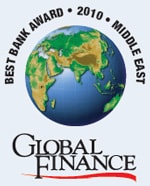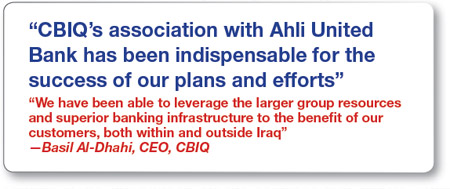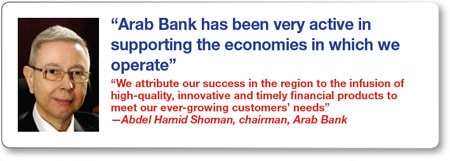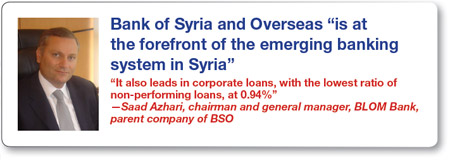MIDDLE EAST
By Gordon Platt
REGIONAL WINNER : National Bank of Kuwait
 National Bank of Kuwait, the leading bank in Kuwait and the highest-rated bank in the Middle East, earned $925 million last year, an increase of 4% from a year earlier, despite challenging local and regional economic conditions and financial markets. Global Finance ranked NBK the safest bank in the Middle East in 2009. NBK’s conservative strategy and disciplined approach to risk management enabled it to maintain and even improve its high asset quality throughout the financial crisis. The bank also benefited from a growing contribution to earnings from its operations outside Kuwait, most notably in Egypt, Qatar and Turkey. It operates in 17 countries, including 10 in the Middle East.
National Bank of Kuwait, the leading bank in Kuwait and the highest-rated bank in the Middle East, earned $925 million last year, an increase of 4% from a year earlier, despite challenging local and regional economic conditions and financial markets. Global Finance ranked NBK the safest bank in the Middle East in 2009. NBK’s conservative strategy and disciplined approach to risk management enabled it to maintain and even improve its high asset quality throughout the financial crisis. The bank also benefited from a growing contribution to earnings from its operations outside Kuwait, most notably in Egypt, Qatar and Turkey. It operates in 17 countries, including 10 in the Middle East.
“Although the impact of the global financial crisis was relatively limited on the banking sector in the Middle East, its implications changed the dynamics of the industry,” says Ibrahim Dabdoub, group CEO of NBK. “Most importantly, we will start seeing more differentiation in the performance of well-managed versus poorly managed banks.”
One of the main lessons of the crisis is for banks to go back to basics and stick to their core business activities, according to Dabdoub. “Like everywhere else, credit growth was excessive before the crisis broke out. But thanks to a strong financial base and government support, banks will be able to absorb the deterioration in asset quality,” Dabdoub says. NBK enhanced its leading domestic franchise last year by raising its stake to 40% in Boubyan Bank, a Kuwait-based Islamic financial institution. It recently received approval to increase that holding to 60%.
Ibrahim S. Dabdoub, group CEO
www.nbk.com

Bahrain
Ahli United Bank
Ahli United Bank’s earnings declined more than 21% last year to $201 million, as it increased provisions for loan losses, including provisions of more than $171 million on Saudi Arabian corporate assets. The bank has cleared the decks by fully absorbing any potential losses on these Saudi accounts and is moving ahead with regional expansion plans. AUB increased its stake in AUB Egypt to nearly 80% from 35%, and it also is acquiring a 40% interest in United Bank for Commerce and Investment in Libya. Meanwhile, AUB is converting its 75%-owned subsidiary, Bank of Kuwait and the Middle East, into an Islamic financial institution, which will operate under the Ahli United Bank name. AUB’s partnership with UK-based Legal & General has begun offering life insurance products, both conventional and Islamic, in Bahrain.
Adel A. El-Labban, group CEO and MD
www.ahliunited.com
Egypt
Commercial International Bank
Commercial International Bank (CIB) has the largest network among private sector banks in Egypt, with 155 branches and more than 500 automated teller machines. CIB also has a strong corporate banking franchise and active brokerage and investment banking operations. The bank posted a 25% rise in earnings last year to $312 million, as Egypt’s economy continued to expand at a healthy pace, due to rising domestic demand. CIB increased its loans by 3.7% in 2009 while maintaining high asset quality and keeping non-performing loans to less than 3% of total loans. CIB is the largest provider of project finance and syndicated loans in Egypt.
Hisham Ezz Al-Arab, chairman and MD
www.cibeg.com
Iran
Bank Tejarat
With some 2,000 branches, Bank Tejarat is one of the largest banks in Iran. All banks in the country must follow Islamic banking principles as mandated by the government. All transactions are performed through Islamic contracts. Iran’s banks hold 38% of all Islamic financial assets worldwide. Bank Tejarat sold 6% of its shares to private investors in May 2009. The bank offers a full range of services, with special expertise in trade finance, project finance and corporate business. It offers a prepaid smart card service for travelers to Iran. The Central Bank of Iran will issue new 100,000-rial banknotes this year, according to Mahmoud Bahmani, governor of the bank. Rising inflation has led the government to issue high-denomination banknotes.
Majid-Reza Davari, chairman and MD
www.tejaratbank.ir
Iraq
Commercial Bank of Iraq
Commercial Bank of Iraq (CBIQ) is one of the largest private sector banks in Iraq. It offers a full range of services to retail and corporate clients. Bahrain-based Ahli United Bank acquired a 49% stake in CBIQ in December 2005. AUB has received approval from Iraq’s central bank to raise its holding in CBIQ to 75% by buying shares on the Iraqi stock exchange. “CBIQ’s association with Ahli United Bank has been indispensable for the success of our plans and efforts to raise our operational and technical standards to be at par with international norms,” says Basil Al-Dhahi, chief executive officer and managing director of the Iraqi bank. “We have been able to leverage the larger group resources and superior banking infrastructure to the benefit of our customers, both within and outside Iraq,” he says. CBIQ recently announced plans to open a branch in Beirut.
Basil Al-Dhahi, CEO and MD
www.ahliunited.com

Jordan
Arab Bank
Arab Bank has a network of 500 branches in regional and global financial centers. Its geographic diversification and strong capitalization have earned it an A3 rating from Moody’s Investors Service and an A- rating from Standard & Poor’s and Fitch. The Amman-based bank’s earnings fell 31% in 2009 to $576 million, mainly due to a $204 million increase in loan-loss provisions. “Arab Bank has been very active in supporting the economies of the countries in which we operate, and facilitating growth in the region is crucial for these growing economies,” says Abdel Hamid Shoman, chairman of Arab Bank. “We attribute our success in the region to the infusion of high-quality, innovative and timely financial products to meet our ever-growing customers’ needs,” he says. Arab Bank is introducing cash management services to complement its trade finance capabilities. It also offers private banking, Islamic banking, investment banking, asset management and project finance services.
Abdel Hamid Shoman, chairman
www.arabbank.com

Kuwait
National Bank of Kuwait
National Bank of Kuwait is the largest and most profitable bank in the country, with a strong financial position and conservative approach to risk. “Our strategy and values have been validated by how we emerged from the financial crisis,” says Ibrahim Dabdoub, group CEO of NBK. “We have great confidence in the future prospects for the group.” NBK gained access to Kuwait’s growing Islamic banking market with its purchase last year of a 40% stake in Boubyan Bank, which could soon be increased to 60%. NBK captured the largest share of new consumer loans in Kuwait in 2009, increasing its leading market share. The bank accounted for half of all new credit cards issued in Kuwait last year. NBK also leads in corporate banking and has a market share of more than 70% with foreign companies operating in Kuwait.
Ibrahim S. Dabdoub, group CEO
www.nbk.com
Lebanon
BLOM Bank
BLOM Bank has 59 branches in Lebanon and operates in a dozen countries, including five in Europe. It opened an investment company in Saudi Arabia this year and a corporate bank in Qatar last July. “BLOM Bank is the most profitable of all Lebanese banks and had the highest growth in loans last year, which rose 16% to more than $4 billion,” says Saad Azhari, chairman and general manager. “It is the market leader by far in retail banking and the most innovative in corporate loans, adopting sophisticated risk assessment and pricing techniques,” he says. The bank recently loaned $130 million to develop the Landmark, a luxury hotel, residential and commercial project in Beirut Central District. BLOM Development Bank offers Islamic banking services under the control and supervision of a three-member shariah board. BLOM Bank is a major participant in Lebanon’s insurance industry through its Arope Insurance subsidiary. Arope also operates in Syria and Egypt.
Saad Azhari, chairman and GM
www.blom.com.lb
Oman
BankMuscat
BankMuscat is Oman’s largest bank, with $15 billion in assets and 125 domestic branches. The bank also has a growing international presence, which includes all six nations of the Gulf Cooperation Council (GCC). It owns 49% of BMI Bank, based in Bahrain, and 43% of Mangal Keshav, a stock brokerage based in India. BankMuscat allowed its 35% strategic holding in Silkbank, based in Pakistan, to be reduced to about 8.5% by not participating in a recent rights issue. To take advantage of growing trade and investment flows between China and the Middle East region, BankMuscat and Bank of China agreed in March to set up a China desk at BankMuscat. “China assumes a very significant role as major trading partner in the region,” says AbdulRazzak Ali Issa, chief executive of BankMuscat. “The agreement marks a pioneering bilateral initiative. The dedicated China desk will lead to BankMuscat tapping into the huge business potential,” he says. As a first step, the banks will sign a master risk participation agreement (MRPA) that covers corporate referrals involving advisory, account openings, fund transfer and trade settlement services.
AbdulRazzak Ali Issa, CEO
www.bankmuscat.com

Qatar
Qatar National Bank
Qatar National Bank has maintained strong growth while keeping tight control of risks. QNB’s earnings rose 15% in 2009 to $1.15 billion. In the first quarter of 2010, profit increased 25% from the same period a year earlier, and Islamic banking returns more than doubled. QNB’s loans and financing activities surged 44% in the first quarter of this year. The bank has the largest branch network in Qatar, and it is expanding throughout the region, as well as in Europe. Last year it opened a private bank in Switzerland, based in Geneva. In November 2009 it opened QNB-Syria, in which it holds a 49% stake. The introduction of QNB Note 1, a capital-protected note that is linked to selected stocks listed on the Qatar Exchange, has enhanced the bank’s position as the largest fund manager in the region. QNB is 50%-owned by sovereign wealth fund Qatar Investment Authority.
Ali Shareef Al-Emadi, group CEO
www.qatarbank.com
Saudi Arabia
Samba Financial Group
Samba Financial Group is one of the largest banks in Saudi Arabia, with assets of $49 billion at the end of 2009. Samba’s earnings rose 2.4% last year to $1.21 billion. The bank reduced its lending by 14% in 2009, while deposits rose 10%. In February 2010, Moody’s Investors Service raised Samba’s foreign currency deposit rating to Aa3 from A1, following a similar increase in Saudi Arabia’s ceiling for such deposits. Samba is the leading provider of corporate financial services in the kingdom. The Saudi Arabian economy is growing again after a nearly flat performance in 2009. The pace of growth could accelerate if credit restraints are loosened more quickly than expected or oil prices surge to new highs, according to the bank’s economists. With the supply of new, affordable real estate still weak, a brisk pickup in non-oil activity would be quickly expressed in higher rents, they say. Inflation should stabilize at around 5% over the next three years, they add. This is high by historical standards but well within bounds for a rapidly developing emerging market.
Sajjad Razvi, managing director
www.samba.com
Syria
Bank of Syria and Overseas
Bank of Syria and Overseas, a subsidiary of BLOM Bank, is one of the largest banks in Syria. With 22 branches, BSO has a 20% market share of deposits in private sector banks in Syria. “We are at the forefront of the emerging banking system in Syria,” says Saad Azhari, chairman and general manager of BLOM Bank. Founded in January 2004, BSO was the first bank to launch retail banking services since Syria began to open up and liberalize its economy. It was also the first bank to issue the Visa International card in Syria. BSO is the largest trade finance bank in the country. “It also leads in corporate loans, with the lowest ratio of non-performing loans, at 0.94%,” Azhari says. BSO owns 52% of Syria and Overseas Financial Services, a brokerage firm that operates on the Damascus Securities Exchange.
Georges Sayegh, general manager
www.bso.com.sy

United Arab Emirates
Mashreq
Mashreq has one of the largest branch and ATM networks in the UAE, as well as online and mobile banking services that offer customers a wide choice of how, when and where they do their banking. Like other major UAE banks, Mashreq had sizable exposure to Dubai World and the troubled Saudi groups, Saad and Algosaibi. The bank’s earnings fell 39% last year to $272 million. Mashreq is the largest private bank in the UAE, and it has a growing regional and international network, with offices in 11 countries. Its assets at the end of 2009 stood at $25.8 billion. “The UAE economy is healthy and performing well,” says Abdulaziz Al Ghurair, CEO of Mashreq. “It has proven time and again its resilience and strength.” The UAE economy is expected to grow by 2% to 3% in 2010. “The regional crisis has been dealt with very cautiously, and organizations now are vigilant when doing business,” Al Ghurair says. “The regional economy is coming up and is stronger now than ever.”
Abdulaziz Al Ghurair, CEO
www.mashreqbank.com

Yemen
Arab Bank Yemen
Arab Bank was the first bank to introduce ATMs and modern banking services to Yemen, the poorest country in the region. Yemen does have oil and gas resources, and it recently began exporting liquefied natural gas (LNG). The country’s growth rate is expected to reach 8% in 2010, thanks to LNG production and large amounts of foreign aid. Yemen’s important honey trade was disrupted by widespread reports in Western media that it was being used to launder money for Al Qaeda. Meanwhile, the nation of 23 million people is facing depletion of groundwater resources and suffering an unemployment rate of 35%.
Omar Ibrahim al-Sous, country manager
www.arabbank.com



